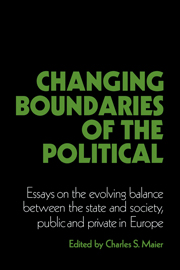 Changing Boundaries of the Political
Changing Boundaries of the Political Book contents
- Frontmatter
- Contents
- List of contributors
- Acknowledgments
- Introduction
- Part I Re-forming the political
- 1 Politics unbound
- 2 Challenging the boundaries of institutional politics: social movements since the 1960s
- 3 Religious transformation and the future of politics
- 4 The politics of time: changing paradigms of collective time and private time in the modern era
- Part II Changing boundaries of political activity
- Part III Uncertain boundaries for political economy
- Index
2 - Challenging the boundaries of institutional politics: social movements since the 1960s
Published online by Cambridge University Press: 05 June 2012
- Frontmatter
- Contents
- List of contributors
- Acknowledgments
- Introduction
- Part I Re-forming the political
- 1 Politics unbound
- 2 Challenging the boundaries of institutional politics: social movements since the 1960s
- 3 Religious transformation and the future of politics
- 4 The politics of time: changing paradigms of collective time and private time in the modern era
- Part II Changing boundaries of political activity
- Part III Uncertain boundaries for political economy
- Index
Summary
Political sociologists and political scientists who analyze Western European politics have made it a commonplace since the 1970s to emphasize the fusion of political and nonpolitical spheres of social life. They have seriously questioned the usefulness of the conventional dichotomy of “state” and “civil society.” Processes of fusion are evident not only on the level of global sociopolitical arrangements, but also among citizens as elementary political actors. The delineation between “political” and “private” (in other words, moral or economic concerns and modes of action) is becoming blurred.
This diagnosis is based on at least three phenomena: (1) the rise of “participatory” moods and ideologies, which lead people to exercise the repertoire of existing democratic rights more extensively; (2) the increased use of noninstitutional or nonconventional forms of political participation, such as protest, demonstrations, and unofficial strikes; and (3) political demands and conflicts concerning issues that used to be considered moral (such as abortion) or economic (such as the humanization of work). Not only are the institutional channels of communication between the citizenry and the state used more often and more intensely by a greater number of citizens and for a wider range of issues; in addition, their adequacy as a framework for political communication is being challenged.
We thus see a rather dramatic model of political development in the advanced Western societies: As public policies exert a more direct and visible impact on citizens, citizens in turn try to win a more immediate and inclusive control over political elites by means fre-quently seen as incompatible with maintaining the institutional order of the polity.
- Type
- Chapter
- Information
- Changing Boundaries of the PoliticalEssays on the Evolving Balance between the State and Society, Public and Private in Europe, pp. 63 - 106Publisher: Cambridge University PressPrint publication year: 1987
- 70
- Cited by
